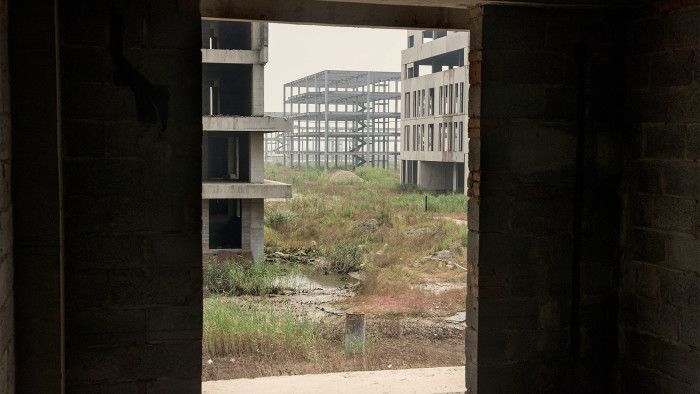Is the Chinese property market wobbling towards collapse?

Simply sign up to the Property sector myFT Digest -- delivered directly to your inbox.
It is overbuilt, it is overpriced and it is overleveraged – is the Chinese property market wobbling towards collapse?
Numbers that were once impressive, such as the perhaps now well-worn fact that in 2011 and 2012 China produced more cement than the US did during the entire 20th century, have since dropped.
The latest figures remain striking, although now for the wrong reasons. In July, house prices fell in 64 of the 70 Chinese cities surveyed by the National Bureau of Statistics, the biggest monthly decline since records began in 2005.
Once a picture of health, the Chinese property market is now looking off-colour with construction activity cooling, land sales slowing, apartment sales sliding and unsold inventory rising. Meanwhile, access to finance is tightening.
If all of the above were happening somewhere else in the world it would still be worrying. Given it is taking place in the world’s second-largest economy makes it all the more alarming: some view China’s spluttering property market as the biggest threat to the global economy. But fears of an imminent collapse similar to that in the US after the subprime crisis are also overblown, say many. “It is not a long-term problem,” says Lan Shen, an economist at Standard Chartered Bank in Beijing.
The sense is that lending conditions for mortgage loans in China are too tight to cause any great concerns. The mandatory down payment ratio for most mortgage loans is between 30 and 40 per cent, even for first-time buyers. Down payments for second homes jump to 60-70 per cent.
As a result, those fearing that a steep fall in house prices might drown banks in bad debt could be overstating the issue. “The slowdown is less severe than the international media has portrayed,” says Ben Luk, global market strategist at JPMorgan Asset Management. This year’s dip has been on everyone’s radar screen, he adds, “but strong household balance sheets and strict mortgage conditions will prevent the sector from derailing the overall economy”.
The International Monetary Fund agrees. In a paper published in April, it ranked China as having the fourth-lowest level of household debt among 11 Asian countries, at some 12 per cent of its gross domestic product. In New Zealand and Australia, debt levels exceed 90 per cent.
But concerns persist. Housing projects continue to lie empty and China’s much-reported and much-hyped “ghost towns“ continue to spook. The belief was that urbanisation would generate sufficient demand to fill the vast apartment blocks being built.
However, the problem has stemmed from the evident mismatch between supply and demand. Massive construction has taken place in second- and third-tier cities where urbanisation was never strong, while building in larger cities has catered for middle-to-high earners, leaving the many low-income households little option but to look on as construction took place. “The increase in house prices has created a huge wealth gap. It is up to the government to match demand and supply dynamics over the longer term,” says Luk.
The consensus is the government is ready to do that. An acceleration in the construction of social housing and a reduction in approval procedures has already taken place. More must be done, however. And what of the implications for the global property market? Knight Frank, the property consultancy, predicts that Chinese money flowing into international property will double before the year is out, with the number of deals originating from China expected to reach their highest levels since 2007.
Will that trend be derailed by issues at home? Russell Platt, chief executive of Forum Partners, a global property investment firm, thinks not. “I would contend that the biggest risk facing the global property market is not China but uncertainty surrounding the extent to which quantitative easing has created abnormally low property yields.”
The local property market is largely funded by Chinese savers and banks, he adds, and the impact of falling prices will “play out in a market that is still largely insulated from the rest of the world”.
——————————————-
Chris Newlands is the editor of FTfm, the FT’s fund management section
Comments